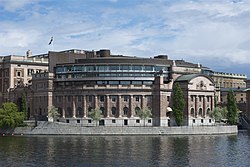Politics of sweden
Sweden is a constitutional monarchy with a parliamentary form of government. The King, Carlos XVI Gustavo, performs only formal functions as Head of State. Parliament is unicameral, with parliamentarians directly elected by proportional representation for four-year terms.
Sweden has universal suffrage from the age of 18. Voter turnout was 81.4% in the 1998 elections.
The Social Democratic Party (SAP) has remained in power, sometimes alone and sometimes in coalitions, during the periods of 1932-1976 and 1982-1991, and also since 1994, while non-socialist parties exercised power center of 1976-1982 and 1991-1994. After the 1998 elections, the SAP formed a minority government occupying 131 of the 349 seats in Parliament. In 2006 the center-right coalition won, which revalidated its mandate in 2010. In 2014 there was a new change of government with a minority government of (SAP) and (MP) with 138 seats and with the support of the left-wing party. In 2018 (SAP) won the elections again and after the January pact, which was a pact between (SAP), (C) and (L) that consisted of liberal politics in exchange for the abstention of (C) and (L) to the investiture of Stefan Löfven. All this results in a minority government of (SAP) and (MP) with the abstention of (C), (L) and (V). In 2022 the right-wing coalition of (L), (KD), (M) and (SD) won, resulting in a coalition government of (M), (KD) and (L) with the support of (SD).
Constitution
The Swedish Constitution consists of four fundamental laws. The most important is the Instrument of Government of 1974, which establishes the basic principles of Swedish political life, defining rights and freedoms. The Succession Act is a treaty between the old Riksdag of the Estates and the House of Bernadotte, regulating their accession to the Swedish royal crown.
The Law on Freedom of the Press of 1766 establishes and defines the rights of freedom of expression and also the free access of citizens to information in the hands of any public institution. It has been amended several times and is dealt with more extensively in the Fundamental Law on Freedom of Expression.
The four fundamental laws are:
- Instrument of Government (1974)
- Succession Act (1809)
- Press Freedom Act (1766)
- Basic Law on Freedom of Expression (1991)
Ministries
The task of the 10 ministries is mainly to propose new laws. Law enforcement is carried out by some 100 central administrative units and 21 provincial administrations. Each province has an elected council, empowered to collect a revenue tax and primarily responsible for health services in its jurisdiction.
Elections
Term term 2022-2026
The elections in September 2022, which elected parliamentarians for the period 2022-2026, gave the following results:
- Social Democratic Party (SAP): 107 seats
- Swedish Democrats (SD): 73 seats
- Moderate Party (M): 68 seats
- Left Party (V): 24 seats
- Center Party (C): 24 seats
- Christian Democrats (KD): 19 seats
- Green Party (MP): 18 seats
- Liberals (Sweden) (L): 16 seats
Resulting in the next government (M+KD+L) with the support of the far-right party (SD). In total they add up to 176 seats compared to 173 for the opposition (SAP, V, C, MP).
Municipalities
Sweden is currently divided into 289 municipalities covering the entire territory, including rural areas, each with a popularly elected council that levies a tax on income and administers public services such as school education, care for infants and the elderly, basic service distribution companies, housing, and cultural and recreational activities. Foreigners who have resided in Sweden for three years have the right to vote and are eligible in local elections.
Ombudsman
Parliamentary Ombudsmans investigate suspicions of abuse of authority by public officials. Other ombudsmen fulfill the mission of defending consumer rights, preventing discrimination based on ethnicity or gender or sexual orientation, ensuring that journalistic ethics are observed, protecting the rights of children and adolescents and those of people with disabilities. Most government documents are accessible to the public and the news media at all times.
Foreign Policy
Swedish foreign policy priorities for 2007 cover the following points:
- Establish cooperation with the following agencies: UN, NATO and EU.
- Promote nuclear disarmament in the world as part of the so-called “New Agenda” made up of Brazil, Egypt, Ireland, New Zealand, Mexico and South Africa.
- Cooperate for the establishment of peace in conflict: Middle East, Darfur, Kosovo and the Congo.
- Cooperate for the reconstruction of Afghanistan (Part of the International Security Assistance Force; ISAF).
- To give high priority to the respect and implementation of human rights in the world.
- Strengthen economic-commercial, educational, technical and scientific cooperation with Latin America.
- Strengthen diplomatic-commercial cooperation with Africa and Asia.
- Strengthen your relations with the US and Canada.
Contenido relacionado
Ciudad Real Province
Elections to the Madrid Assembly of October 2003
Death penalty (disambiguation)
